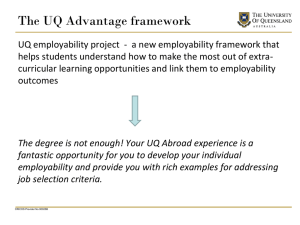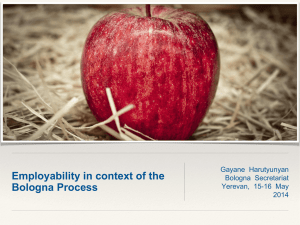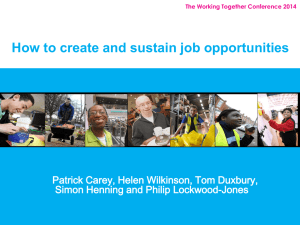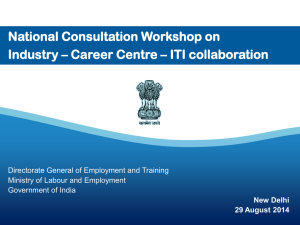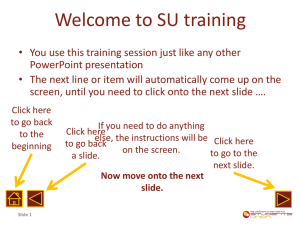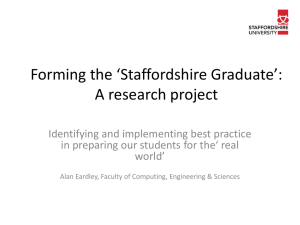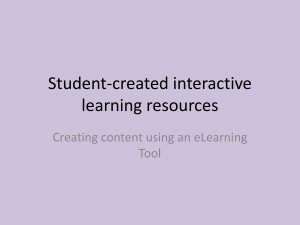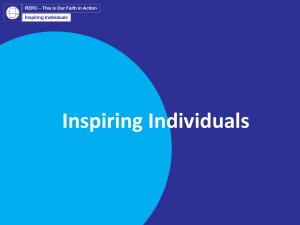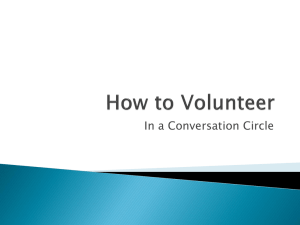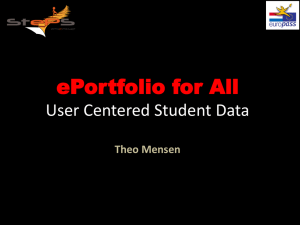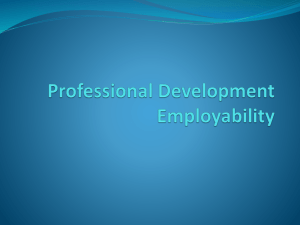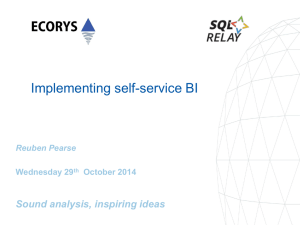Storytelling - Alliance for Work
advertisement
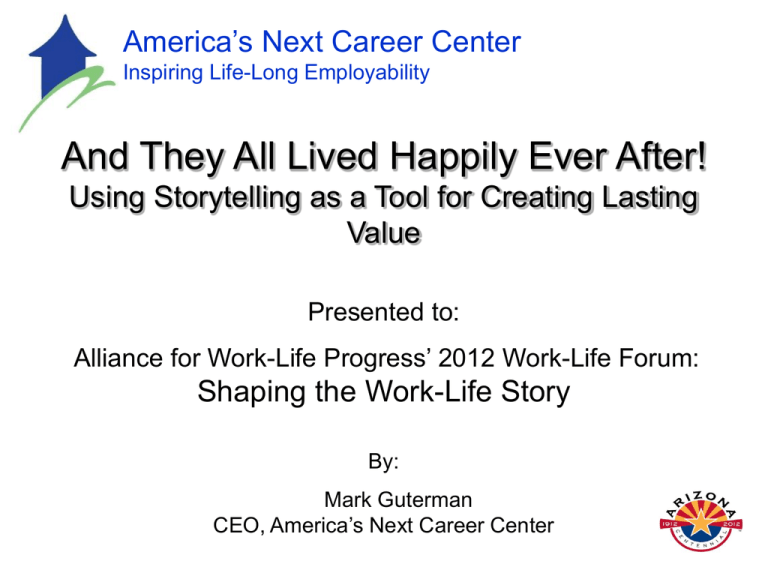
America’s Next Career Center Inspiring Life-Long Employability And They All Lived Happily Ever After! Using Storytelling as a Tool for Creating Lasting Value Presented to: Alliance for Work-Life Progress’ 2012 Work-Life Forum: Shaping the Work-Life Story By: Mark Guterman CEO, America’s Next Career Center America’s Next Career Center Inspiring Life-Long Employability Once Upon a Time . . . America’s Next Career Center Inspiring Life-Long Employability Today’s Agenda (page 2) AM Session: • Opening: Welcome, Session purpose, agenda, and process; Ice Breaker exercise • The Power of Storytelling: Types of stories; Elements of compelling stories; Crafting your stories • Individual and Small Group Exercise: Two responses to a scenario: Your business response and your storytelling response. • Using Storytelling to Make the Business Case: Influencing, persuading, balancing the head and the heart, adapting PM Session: • Reconvene: Future Perfect Exercise • Group Exercise: Developing/practicing stories that lead to lasting value and change • Closure: Final questions and next steps America’s Next Career Center Inspiring Life-Long Employability Ice Breaker Exercise: Favorite Stories (page 3) • Pair up; • Share two favorite stories: One from childhood and one from the present--these can be real or fantasy; • Discuss what makes these stories memorable and what lessons you take from them. America’s Next Career Center Inspiring Life-Long Employability Types of Stories* (page 4) • The Origin Story (Transmitting values) • The Hero/ines’ Story (Communicating who you are) • The Teaching Story (Sharing knowledge, fostering teamwork) • The Fable, Allegory, or Metaphor (Identifying with something meaningful, branding) • The Springboard Story (Sparking action, leading people into the future) *Adapted from The Leader’s Guide to Storytelling America’s Next Career Center Inspiring Life-Long Employability It was the best of times, it was the worst of times . . . America’s Next Career Center Inspiring Life-Long Employability . . . it was the age of wisdom, it was the age of foolishness, it was the epoch of incredulity, it was the season of light, it was the season of darkness, it was the spring of hope, it was the winter of despair, we had everything before us, we had nothing before us, we were all going to heaven, we were all going the other way. Charles Dickens, A Tale of Two Cities America’s Next Career Center Inspiring Life-Long Employability More than anytime in history, humankind faces a crossroads. One path leads to despair and utter hopelessness. The other to extinction. Let us pray that we have the wisdom to choose correctly. Woody Allen America’s Next Career Center Inspiring Life-Long Employability The Springboard Story* (page 5) • The change idea is clear and worthwhile • Based on a real situation • The audience can relate to the protagonist • The story is specific as to time and place • The story makes clear what would have happened without the change idea • The story is brief and gives minimal detail • The story has a positive ending *Adapted from The Springboard America’s Next Career Center Inspiring Life-Long Employability Exercise: Developing a New Work/Life Program (page 6) • Looking ahead to the next year, what new work/life program would be of value to your organization? • Briefly articulate its parameters: • • Who is the target population? • What is the scope of the program? • What would it take to get it started (time, resources, money)? • How will you measure its impact? Develop two ways to articulate your business case for launching the program: 1. Your typical/usual way to persuade leadership 2. • A story (or stories) to persuade leadership Share the two versions of your business case with your partner America’s Next Career Center Inspiring Life-Long Employability The work of the change agent is to lead conversations about what’s essential and what’s not. Adapted from Ronald Heifetz America’s Next Career Center Inspiring Life-Long Employability Making the Business Case (page 7) • Make your stories simple & elegant • Your story must be respectful of the culture and the complexities it presents • Your story should recognize both the possibilities of unintended consequences • Create stories that support short-term impact and long-range results • Test, learn, and revise • Utilize social media, as appropriate, to disseminate your stories America’s Next Career Center Inspiring Life-Long Employability Even if you are on the right track, you’ll still get run over if you just sit there. Will Rogers America’s Next Career Center Inspiring Life-Long Employability Exercise: Future Perfect (page 8) • Identify a challenging work-life problem or issue that your organization is facing; • Imagine a time in the future when the problem issue has been completely resolved; • Develop the first several steps of an action plan that keeps this future perfect picture in mind; • Share your vision and steps with a partner. America’s Next Career Center Inspiring Life-Long Employability Crafting a Springboard Story (page 9) Developing Your Story Brief Embody the change message Intelligible Identify with the protagonist Interesting Organization-centric New understanding True Happy ending Test the story Performing Your Story Understand the audience Non-verbal aspects Believe in your story Practice the story Ready to deliver Using Visual Aids Reinforce your message Help you to stay on track America’s Next Career Center Inspiring Life-Long Employability Exercise: Crafting a Springboard Story (pages 10 and 11) • Articulate what a “culture of flexibility” looks like • Identify the types of work/life programs would add value in this culture • Identify the expected outcomes from these programs • At your table, develop two springboard stories that best communicate the culture, the programs, and the outcomes. • Prepare to tell one of the stories by identifying the storyteller(s) and rehearsing how to present the story • Present your story America’s Next Career Center Inspiring Life-Long Employability Final Questions (page 12) • What is driving the need for work/life programs? • What is the commitment from key stakeholders? • Where is your organization in the business cycle? • What other issues need to be addressed in parallel or prior to your work/life efforts? • Who will own, champion, and support the process? • What expertise do you have/need to sustain work/life efforts? • What infrastructure is in place to support work/life efforts? • What stories will support and carry your message? America’s Next Career Center Inspiring Life-Long Employability Next Steps (page 13) • What did you learn in today’s session? • What will you do to practice what you’ve learned? • What ideas/thoughts do you have for further development? America’s Next Career Center Inspiring Life-Long Employability . . . and they all lived happily ever after!
